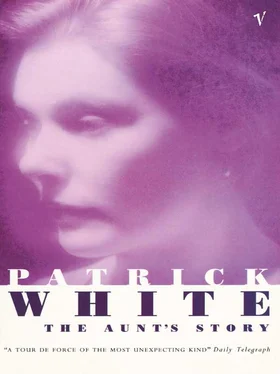Theodora crunched across the sharp gravel, towards a bench, to sit. The air of the jardin exotique was very pure and still. Shadows lay with a greater hush across its stones, as if the abstracted forms to which the shadows were attached could only be equalled by silences. The garden was completely static, rigid, the equation of a garden. Slugs linked its symbols with ribbons of silver, their timid life carefully avoiding its spines.
Notre jardin exotique , Monsieur Durand had said, but his pronoun possessed only diffidently. It was obvious enough now, Theodora knew. This was a world in which there was no question of possession. In its own right it possessed, and rejected, absorbing just so much dew with its pink and yellow mouths, coldly tearing at cloth or drawing blood. The garden was untouchable. In the white sunlight that endured the cactus leaves, Theodora looked at her finger, at the single crimson pinhead of her own blood, which was in the present circumstances as falsely real as a papier mâché joke.
Walking slowly, in her large and unfashionable hat, she began to be afraid she had returned to where she had begun, the paths of the garden were the same labyrinth, the cactus limbs the same aching stone. Only in the jardin exotique , because silence had been intensified, and extraneous objects considerably reduced, thoughts would fall more loudly, and the soul, left with little to hide behind, must forsake its queer opaque manner of life and come out into the open.
If, of course, the soul ventured in. Theodora found her bench. She sat beneath a crimson-elbowed thorn. Her hands lay empty in her lap, but waiting to touch. Somewhere there would be people, she knew, reassured by a clatter of forks that came from the rear of the comfortable hotel. So she waited, and watched, and listened to the forks, that must be clattering for lunch.
Through the vines and the window the boy in the tight trousers, who just failed to pirouette, sailed on the smile of his own reflection, contemptuously dropping electroplate on to the little separate chequered tables. Theodora knew that she would fear the tight boy, and that she would be included in the contempt he felt for cutlery. She dreaded her island in the dining room, and the great oceans of dinner and lunch. She never survived the judgement of hotels, because she was not made of scorn. But, in the meantime, the boy sang. He sang like any tango, and his voice smelled of caporal bleu . He was smoothed down. She could feel his dark vanity soothed, smoothed at last, to the consistency of discs, as the words of his tango, its rêves and fièvres , dulled the sound of forks.
Behind the vines, pipes, and plaster patches, under the pressure of its inner life, the rear of the comfortable hotel began to expand. It reassured, like the breathing of eiderdowns in childhood, or the touch of hands. But it was only just tolerated by the sceptical, dry, chemical air of the jardin exotique in which Theodora sat. From the garden the hotel was making the best of things. Theodora had the uncomfortable impression that this is all one can expect.
But all the time, inside the hotel, there were the signs of shabby hopefulness, the rushing of water, spit of fat, a square woman at a window who dropped a ball of hair from her comb, the listening face of Henriette. The tight boy, thinking he was unseen, smiled through the vines at a patch of sunlight. For the moment he could ignore the exigencies of love and hate, vanity and self-pity. Even though she had not yet seen them, Theodora could feel that the hotel was full of people, and she waited to touch their hands.
A slight breeze began to play with the cactus fingers. They creaked. The pads of the prickly pear moved in the air as dignified as blotting paper. Age and wisdom, intensified to a point that was unwise, rustled their eyelids, and looked.
But the girl who now ran into the garden, out of the hotel, the girl was young. Unlike General Sokolnikov and Madame Rapallo, who had settled in years ago, the girl had not yet remained anywhere very long.
‘I am tired,’ she said. ‘I am tired of all this. I shall write and tell them I must go away.’
Her white light fell among the cactus roots that she did not see. You did not feel the girl had ever paused long to consider the jardin exotique . It was something described by a brochure to entice old women with embroidery.
‘This is no way to be’ave,’ said the square woman who had thrown her dead hair from the window, and who now followed the girl out. ‘To grumble at your Mummy and Dad, who do what they do for the best, and you know they do.’
‘Motives are difficult to understand, without faces,’ said the girl. ‘It is so long since I saw them.’
‘That is ungrateful, Katina,’ said the square woman, sucking her plate.
‘But it is true. Truth is often ungrateful.’
The girl spoke to herself, the words she had saved so long they were heavy and swollen. Her lips were thoughtful with bitterness and sun. Her hair had been set in a shop. It was very beautiful, and black, but not right. It continued to contradict the authority of fashion, for it is not possible to tie up a bundle of black snakes and then contain their seething. So the girl’s hair escaped. She was white and black. Her skin had the bluish undertones of snow and marble. She had run out of the hotel, and Theodora thought of doves, the warm white flight from the cot into the sun. She thought of the one she had held in her hands, both frail and throbbing with impulsion, waiting to burst skywards on release.
‘You do not realize, Grigg dear,’ said the girl. ‘I must go home.’
Her voice died. Each moment of waiting was a death. And Theodora Goodman had become a mirror, held to the girl’s experience. Their eyes were interchangeable, like two distant, unrelated lives mingling for a moment in sleep.
Th square woman pawed the ground.
‘Your parents will take you,’ she said, ‘when they think fit.’
‘Where?’ asked the girl. ‘To the next hotel? To suffocate amongst ash trays. To play at islands in a billiard room.’
‘And what is wrong with ‘otels?’ the square woman said. ‘Provided there is hot and cold.’
‘I must go home,’ said the girl. ‘Before I have quite forgotten. There was an earthquake, do you remember? And we ran and lay on the beach. There was a black island that shook.’
Theodora trembled for the black island. She looked across at the opposite shore, which was just there, in the sea glaze. The earth was a capsule waiting for some gigantic event to swallow it down. Theodora looked at the island and waited for it to move.
‘Miss Theodora,’ said Katina, or her small extinct voice, ‘I think that the wind has died.’
‘Yes,’ said Theodora, ‘it is most surely dead.’
In fact, it hung, a dead thing, from the twigs of the ragged pine. People came and went, their shrunk faces, their bare feet. Something would happen, they said, but not yet.
‘“Then it was that Lord Byron, with a gesture of great gallantry, put at the disposition of the desperate Greeks his fortune and his life,”’ Katina read.
Walls yawned, the walls of the chapel against which the pine stood, and rubbed, not now, but when there was a wind. Now the walls yawned, in anticipation of the event.
‘I think we shall not read any more. Dear Miss Theodora, would you mind?’ Katina said. ‘I would like better to have a talk. About life and things.’
Miss Theodora looked at Katina. She could not often mind, because with Katina, her subtle sleek touch, it was like that. Touching the cheek, Katina melted bones.
‘Normally I should mind,’ Miss Theodora said. ‘But now it it quite definitely far too hot.’
Читать дальше












